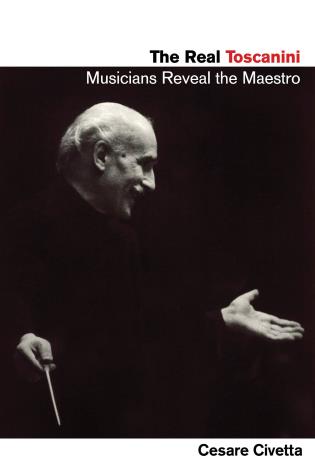
MACMILLAN/MPS - 119325
The Real Toscanini: Musicians Reveal the Maestro
Author: Cesare Civetta
Publisher: Amadeus
Quantity:
Pickup available at Juilliard Store
Usually ready in 4 hours
The Real Toscanini: Musicians Reveal the Maestro
Juilliard Store
Pickup available, usually ready in 4 hours
144 West 66th Street
New York NY 10023
United States
Choose options
Quantity:
Pickup available at Juilliard Store
Usually ready in 4 hours
The Real Toscanini: Musicians Reveal the Maestro
Juilliard Store
Pickup available, usually ready in 4 hours
144 West 66th Street
New York NY 10023
United States
Quantity:
Pickup available at Juilliard Store
Usually ready in 4 hours
The Real Toscanini: Musicians Reveal the Maestro
Juilliard Store
Pickup available, usually ready in 4 hours
144 West 66th Street
New York NY 10023
United States
Lauded by Verdi, Debussy, and other music legends, the celebrated conductor Arturo Toscanini raised the standards of orchestral and operatic performance over an astonishing 69 years on the podium. But as he did so, he acquired a reputation as something of a tyrant, who unleashed an explosive temper at musicians if rehearsals did not meet his expectations.
In The Real Toscanini, Cesare Civetta presents an intriguing collection of vivid, one-of-a-kind interviews with artists who performed with Toscanini. A portrait of the inner workings of the maestro emerges through these extensive conversations, conducted by the author over a period of 20 years, together with other firsthand recollections. These accounts clarify Toscanini's philosophy, musical style, and techniques. They depict a man tormented by inner demons of anger and depression, which were easily triggered by his frustration at being unable to produce the musical ideal in his mind's ear.
Toscanini is also revealed as a vehement anti-Fascist and an unequivocal opponent of totalitarianism and racism – he defied Mussolini and publically opposed Hitler. The book includes a comprehensive account of his 1936 inauguration of what is now known as the Israel Philharmonic, in solidarity with Jewish refugee musicians.
Toscanini comes through in this book as a tortured but deeply humane individual who strove to constantly improve – a sincere and humble musician who was nevertheless the preeminent maestro of the 20th century.
In The Real Toscanini, Cesare Civetta presents an intriguing collection of vivid, one-of-a-kind interviews with artists who performed with Toscanini. A portrait of the inner workings of the maestro emerges through these extensive conversations, conducted by the author over a period of 20 years, together with other firsthand recollections. These accounts clarify Toscanini's philosophy, musical style, and techniques. They depict a man tormented by inner demons of anger and depression, which were easily triggered by his frustration at being unable to produce the musical ideal in his mind's ear.
Toscanini is also revealed as a vehement anti-Fascist and an unequivocal opponent of totalitarianism and racism – he defied Mussolini and publically opposed Hitler. The book includes a comprehensive account of his 1936 inauguration of what is now known as the Israel Philharmonic, in solidarity with Jewish refugee musicians.
Toscanini comes through in this book as a tortured but deeply humane individual who strove to constantly improve – a sincere and humble musician who was nevertheless the preeminent maestro of the 20th century.
